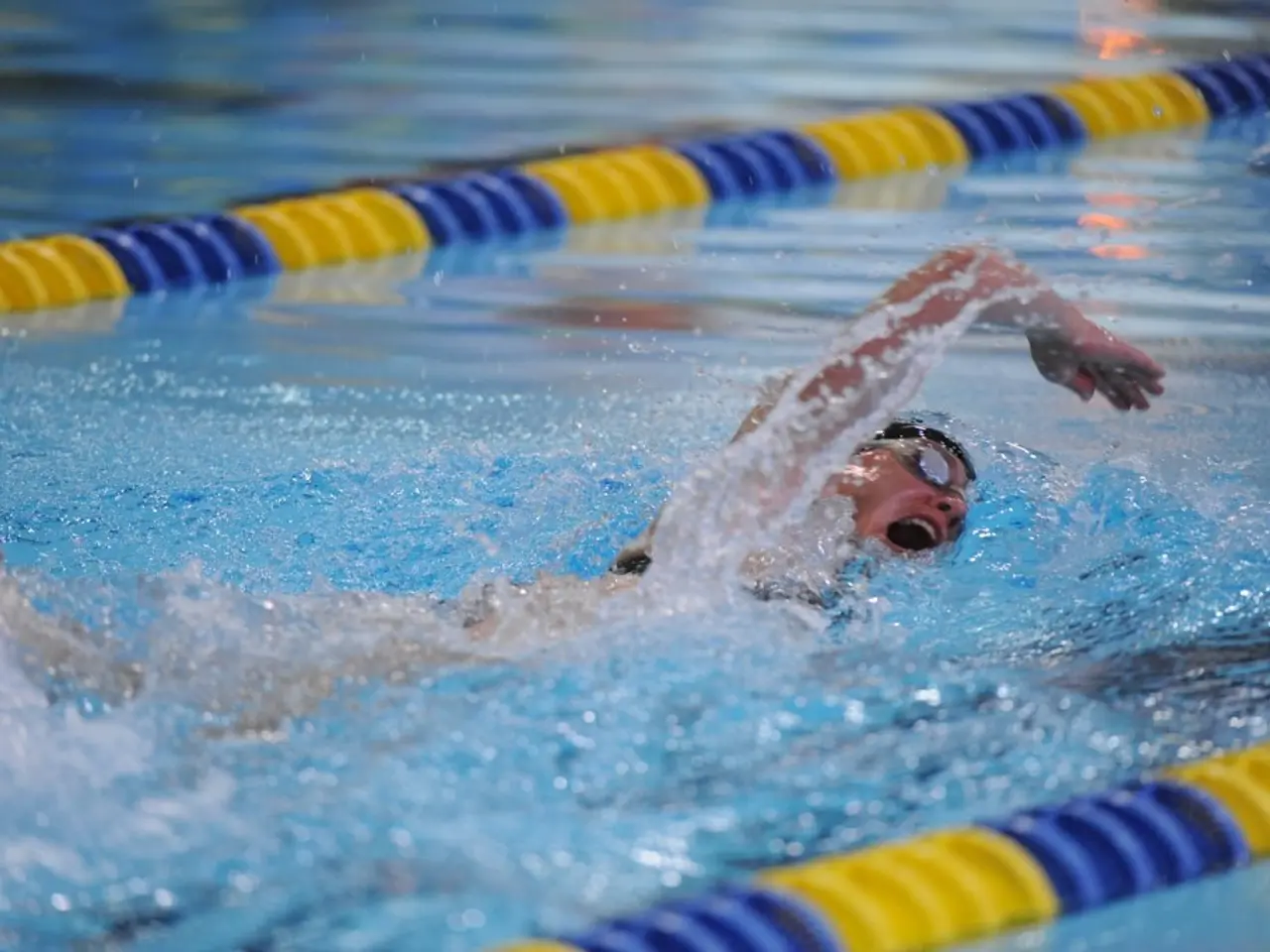Restrictive measures imposed on open-air baths
In the city of Lörrach, located in the German state of Baden-Württemberg, a new bathing regulation has been implemented, aiming to maintain hygiene standards and enhance swimmer safety. The regulations require form-fitting swimwear made from synthetic materials, such as polyester or nylon, and prohibit cotton and loose-fitting garments with pockets [1].
The primary reasons behind these regulations are hygiene and safety concerns. Tight swimwear made from specific materials is easier to keep clean and less likely to contaminate swimming water. Cotton and loose-fitting swimwear can absorb a lot of water, become heavy, and introduce dirt and fibers into pools or bathing areas, affecting water quality and filtration systems [1].
Safety concerns also play a significant role. Tight swimwear reduces drag and the risk of entanglement or snagging that can happen with loose or baggy clothing with pockets. Pockets or loose fabrics potentially trap water, making swimming cumbersome and increasing drowning risk. Rescuers and pool supervisors prefer swimwear that minimizes such hazards for ease of movement and quick rescue if required [1].
Many pools and public bathing areas in Baden-Württemberg have adopted these regulations to ensure uniform standards of swimwear that promote swimmer safety and pool hygiene. Incidents where visitors were asked to leave pools for not complying with these rules have been reported, indicating strict enforcement [2].
However, exceptions have been made in some cases. For instance, children up to the age of 14 are allowed to wear long-sleeved bathing attire in the city of Müllheim [2]. Women are allowed to wear form-fitting swimwear that reaches no higher than the knee [2].
The city of Lörrach, where these regulations were first implemented, has noted a continuous decrease in the number of complaints since implementing the new dress code [2]. However, some individual complaints have been made about the new dress code, which is a fundamental change [2]. Councilwoman Dora Pfeifer-Suger (Greens) suspects systematic exclusion and discrimination in the new bathing regulations, particularly regarding women in burkinis [2].
The new regulations have received mixed feedback from bathers. Many have expressed positive feedback about the new dress code, but it remains unclear whether it can prevent sexual harassment [2]. A ban on swim trunks with pockets is also in effect at some baths to prevent littering [2].
Manuel Ostermann, first deputy chairman of the DPolG Federal Police Trade Union, views the new dress codes as a strong signal for sexual self-determination and individual freedom of women [2]. However, concerns about potential discrimination and the impact on sexual harassment continue to be discussed.
Meanwhile, in neighbouring Bavaria, there has been an increase in crimes against sexual self-determination, with 227 cases in 2021. In 2023, there were 193 cases, and in 2022, 171 cases were registered. These incidents occurred at beaches, bathing spots, swimming pools, outdoor pools, and bathing establishments [3]. Almost two-thirds of the suspects in these crimes were foreign nationals [3].
City spokesman Fessler of Lörrach states that every exception carries the risk of misunderstandings and unnecessary discussions [2]. He emphasises the importance of maintaining clear and consistent regulations to ensure safety and hygiene in public bathing areas.
References: [1] https://www.badische-zeitung.de/stadt-region/loerrach/loerracher-badesee-schwimmen-nur-mit-formfittenden-kostuen-116132682.html [2] https://www.badische-zeitung.de/stadt-region/loerrach/loerracher-badesee-schwimmen-nur-mit-formfittenden-kostuen-116132682.html [3] https://www.badische-zeitung.de/region/baden-wuerttemberg/sexuelle-belastungen-gehen-in-baden-wuerttemberg-zurueck-116063176.html
- Given the new bathing regulations in Lörrach, individuals are required to apply form-fitting swimwear made from synthetic materials, which promote hygiene and safety by reducing the risk of contamination and entanglement in swimming water.
- The implementation of these regulations extends beyond hygiene and safety, as they also serve to uphold mental and physical health, with the right swimwear choices contributing to a healthy lifestyle and fashion-and-beauty consciousness.
- The public discourse surrounding these regulations has touched upon trivial matters like fashion, but also significant topics such as sexual-health and crime-and-justice concerns, with some arguing that these rules may impact sexual self-determination and potential discrimination.
- Beyond Baden-Württemberg, in neighboring Bavaria, general-news reports are highlighting a rise in crimes against sexual self-determination, echoing the growing importance of ensuring such protection and safety across public spaces like beaches, bathing spots, swimming pools, and bathing establishments.








